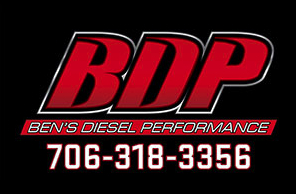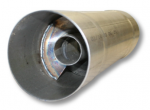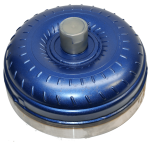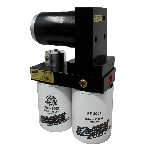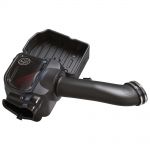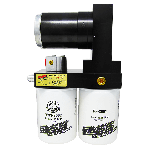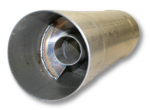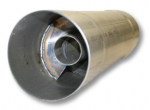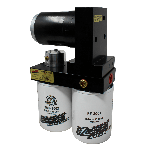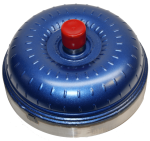AirDog II-4G Fuel Air Separation System DF-165 GPH 2011-14 LML Duramax A6SABC410
Applications:
AirDog II-4G - 4th Generation Fuel System
Advancing the AirDog® Tradition with the 4th Generation Fuel System! The AirDog® II-4G system improves engine performance by:
- Maintaining Correct Injection Timing
- Eliminating Spray Pattern Disruption
- Allowing for a Full Power Stroke and Complete Burn
AirDog II-4G Benefits
- Increased Fuel Economy
- Increased Power Output
- Increased Torque Output
- Longer Injector Life
- Improved Throttle Response
- Reduced Exhaust Emissions
- Optimized Engine Performance
- AirDog® II-4G also overcomes loss of power for diesel engines operating at higher altitudes.
AirDog II-4G Features

- Dual Feed Gerotor Pump
- Low amperage motor provides efficiency and endurance
- Self-aligning motor requires less maintenance and reduces noise levels
- Intermediate pump shaft seperates motor from fuel
- Small & Compact: ONLY 7″L X 10″T X 3.2″W
AirDog Replacement Filter Options

- Replacement AirDog Fuel Filter 2 micron (Part Number FF100-2)
- Replacement AirDog Water Separator (Part Number WS100)
AirDog II Fuel Air Separation System Featuring Demand Flow Technology

AirDog® II-4G is designed to operate at flows and pressures beyond the maximum requirements of the engine. It receives fuel under vacuum from the fuel tank containing entrained air/vapor, particulate contaminates and unknown quantities of water.
The fuel passes through the water separator which removes the large particulate contaminates that could damage or jam the gerotor fuel pump. The fuel, with only entrained air/vapor and tiny particulate contaminates remaining, then enters the fuel pump.
The fuel, now under positive pressure flow, enters the fuel filter. As the fuel passes through the filter media and the remaining particulate contaminates are caught and contained, the entrained air/vapor is also separated. Through the positive fuel air separation features of the patented AirDog® II-4G the separated air/vapor is discharged from the filter and back to the fuel tank through the Primary Air/Vapor Discharge Port.
The fuel passing through the filter media is now free of contaminates and power robbing air/vapor. At pressures and flows able to meet the needs of the engine, it exits the fuel filter through two passageways. First, the fuel for the engine, passes into the fuel pickup tube and on to the engine. Then, the excess fuel not needed by the engine recycles internally through the pressure regulator back to the water separator.


GM Makes and Models - Duramax Diesel
The Duramax is probably the most responsive to an aftermarket lift pump. The GMC and Chevy Duramax pick-up trucks do NOT have a lift pump to supply fuel to the engine. From the factory, the CP3 injection pump is the truck's only means of getting fuel from the tank to the engine. If you were to look at the video of “How the AirDog works” it will show you what happens when the CP3 pump pulls fuel from the tank to the engine. Therefore because the fuel is under constant suction it causes cavitation and excessive wear and tear on injectors and your injection pump. Also, this is the #1 cause of low rail pressure codes when adding aftermarket programmers or tuners that increase the demand for fuel. By providing both constant positive fuel pressure and 100% pure fuel to the engine, is where you get the added benefits of smoother and quieter idle, better throttle response, increased fuel economy, better mid-range through top end power and more consistent rail pressure to support both stock and modified engines.
Because AirDog® has a few different systems for the Duramax, install difficulty and times will vary. For example; The AirDog II, FP100 and Raptor pump kits do not require you to drop the tank to install the system. Because of the AirDog® OEM style quick connect fittings and internal pump design on the AirDog II, you will simply hook the suction line to the factory fitting on the fuel tank sending unit. However, if you're going to install an AirDog FP150, this will require dropping the tank to install a 1/2″ suction tube. None of the Raptor kits require a suction tube to be installed.
As for the rest of the install, for fuel supply, all of the systems will either hook to the factory steel feed line that runs up to the engine or the line directly on the engine, AirDog gives the choice of hooking to either spot based on your mechanical capabilities. On the AirDog and AirDog II systems, the entrained air and un-used fuel will be sent from the system back to the tank through the fuel filler tube. Also, the factory fuel filter housing will remain in use when using any of the AirDog or Raptor fuel systems.
Many people ask why the AirDog II, with its higher flow rate doesn't need the 1/2″ suction tube. The reason for that is the way the AirDog II is designed internally. The AirDog II recycles fuel back through the base to keep the system constantly full, therefore returning less and making it a true “ON Demand” system. Also, all of the AirDog and AirDog II systems have a built in pressure port on the top of the base directly above the fuel filter, it's plugged with an 1/8″ pipe plug and can be removed and utilized to check pressure from.
